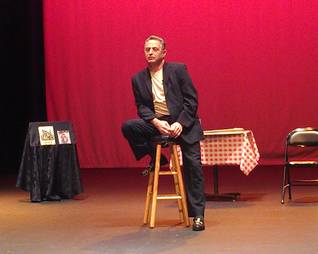
Salvatore Polisi presents his one-man show “At the Sinatra Club” at the Clark County Library Theater.
Sunday, July 22, 2012 | 6:15 p.m.
It all began with the Hershey’s kisses.
As a young boy, Salvatore “Sal” Polisi would steal pieces of chocolate for his sister. As he grew older, he graduated to stealing cars, robbing banks and running gambling operations.
The former New York mobster recounted his tale of organized crime to a packed audience in the Clark County Library Sunday while promoting his book, "The Sinatra Club: My Life Inside the New York Mafia."
Polisi spent more than 15 years in the Mafia, working among kingpins like John Gotti before setting his life straight and finding redemption working for the FBI.
For Polisi, the path of crime came naturally. He loved the action and thrill that came with vehicle heists and bank robberies. He followed in the footsteps of his uncle Tony, who ran a nightclub packed with mobsters — and who was later sent to jail for bank robbery.
Despite his uncle’s sentence, Polisi agreed to help two bank robbers who had just gotten out of jail. In what he describes as “the biggest adventure of his life,” Polisi grabbed money from the tellers while the two men held up the people inside.
Later, Polisi opened a gambling joint frequented by mobsters, including John Gotti, who entered into a partnership with him. Since the club did not have a jukebox, Polisi arranged to have someone steal one. Throwing away the Polish records inside, Polisi replaced them with Frank Sinatra’s music. Thus, the joint came to be known as “The Sinatra Club.”
In 1972, the movie “The Godfather” was released, glamorizing life in the Mafia. Watching the positive reactions of the audience, he could not help but feel idolized. As one of his buddies said, “They love the movie! They love the characters! They love … us.”
During his life of crime, not every heist was successful, Polisi said. One time, he and his buddies had robbed a truck filled with shoes, only to find that they were only fit for the left foot.
Other times, Polisi was luckier. After being spotted by a police officer, he vomited on the floor while his friend told the officer that they had to go to the hospital. Forgetting he had any reason to be suspicious, the officer took them to the hospital and left soon afterward.
In 1974, Polisi turned himself in for bank robbery and was sent to prison. It was there that his wife visited and informed him that one of his close friends, a fellow mobster, had died after being shot four times in the head.
“Well, that’s the way it goes. It’s all part of this life,” he said nonchalantly. Later that night, he saw his reflection and, for the first time in his life, he said he felt emotion and “cried like a little boy.”
After being released from prison, Polisi returned to New York City to make money; all he needed was a spoon and a strainer to mix the drugs. He got caught and decided to set his life straight to prevent his sons from following in his footsteps. Polisi agreed to go undercover for the FBI and turn in his fellow mobsters.
“The first time in my entire life that I do something legal, it was just as exciting as robbing banks!” he said.
Polisi went on to write Hollywood screenplays, drawing on his experiences.
“It’s a great experience to make a movie. Is it easy? No. The mob will kill you with a gun. Hollywood? They’ll kill you with a pencil. They will rip you off,” he said.
He traveled the country, speaking at schools, churches and FBI conferences. But he still had enough gumption left in him for one last robbery.
When his grandson was featured in a book of wallpaper samples at a hardware store, he visited the store and asked an employee if he could have it. After being told no, Polisi took it anyway. He still shows it off.
“Dad, you backslid,” his son told him when Polisi confessed his crime.
Polisi ended his performance with a warning for anyone considering a life of crime.
“Crime doesn’t pay,” he said. “Unless you own the Mob Museum.”

Join the Discussion:
Check this out for a full explanation of our conversion to the LiveFyre commenting system and instructions on how to sign up for an account.
Full comments policy